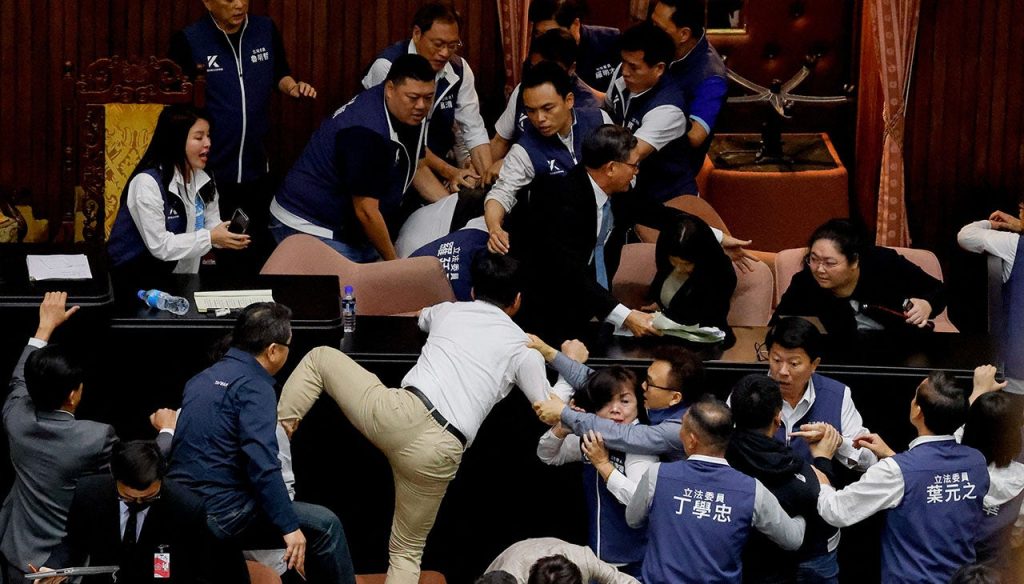Taiwan’s parliament erupted into a violent brawl as lawmakers clashed over proposed reforms. The chaotic scene, captured on video, showed punches being thrown, a curtain being ripped, and a lawmaker falling and being rushed to the hospital. The fight occurred just before President-elect Lai Ching-te was set to take office with his party in the minority, succeeding President Tsai Ing-wen, from the same party. The controversial reforms included imposing criminal penalties for officials caught lying in parliament, sparking accusations of unconstitutional abuse of power by the opposition.
Lawmakers were seen jumping over tables and physically attacking each other, leading to concerns about the future civility of the parliament. This is not the first instance of chaos in Taiwan’s legislative body, as previous incidents have involved the throwing of pig guts during a dispute over pork imports in 2020. Despite winning a minority of seats, Lai’s Democratic Progressive Party is working with the opposition Kuomintang and the Taiwan People’s Party. The proposed reforms coincide with a delicate period in Taiwan’s relationship with China, which views the island as part of its territory rather than a sovereign nation. Lai has previously advocated for Taiwan’s formal independence, but the DPP has taken a more cautious approach recently.
Amidst the turmoil in Taiwan’s parliament, the country’s Foreign Minister has called for global unity against “expansionism” by China and Russia. The violent brawl highlights the deep divisions within Taiwan’s political landscape, with accusations of power abuse and concerns about maintaining civility in the chambers. The opposition has been accused of attempting to push through reforms without following due process. The DPP, which has traditionally held power in Taiwan, is facing challenges from the KMT and TPP, as they attempt to navigate complex domestic and international relations.
The chaos in Taiwan’s parliament underscores the complex geopolitical landscape in the region, with Taiwan standing as a major line of defense against potential conflict with China. The country’s relationship with China remains fraught, as Beijing continues to assert its territorial claims over Taiwan. As Lai prepares to take office, Taiwan faces significant challenges in navigating its complex relationship with China, as well as managing domestic political tensions. The brawl in parliament serves as a stark reminder of the divisions and challenges facing Taiwan as it seeks to assert its sovereignty and maintain stability in the face of external pressures.
The violent altercation in Taiwan’s parliament highlights the deep-seated political divisions and tensions within the country. The clash over proposed reforms reflects the broader challenges facing Taiwan as it grapples with domestic political dynamics and complex relationships with China and other regional powers. The aggressive behavior displayed by lawmakers underscores the intensity of the disagreements and rivalries within Taiwan’s political landscape, raising concerns about the future stability and civility of the parliament. As Taiwan prepares for a transition in leadership and grapples with ongoing geopolitical challenges, the brawl serves as a vivid reminder of the complexities and uncertainties facing the island nation.


